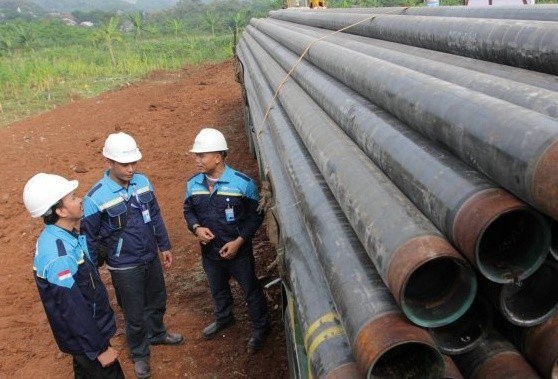Popular Reads
Top Results
Can't find what you're looking for?
View all search resultsPopular Reads
Top Results
Can't find what you're looking for?
View all search resultsTwo more industries to get gas price cuts
Change text size
Gift Premium Articles
to Anyone
T
he government aims to lower gas prices for the ceramics and sheet glass industries this year, adding to three other industries previously set for reduced tariffs.
Last year President Joko “Jokowi” Widodo ordered his Cabinet to slash down gas prices to below US$6 per million British thermal unit (mmbtu) for 10 industries and one industrial zone starting from January.
However, Energy and Mineral Resources Ministerial Regulation No. 40/2016, issued last December, only stipulates the reduced rate at around $6 per mmbtu for the petrochemical, fertilizer and steel industries starting from Jan. 1.
Even so, Industry Minister Airlangga Hartarto said that discussions on price cuts for the ceramics and sheet glass industries would commence in January.
“Both of them have strategic potential. In terms of ceramics, the raw materials can be found in Indonesia and this makes our competitiveness strong. Similarly, sheet glass can be used as part of photovoltaics, which contributes to renewable energy,” Airlangga recently said.
The minister also pointed out that the strong competitive edge of both industries will enable them to cope with technology changes.
For more than a decade, Southeast Asia’s largest economy has struggled with deindustrialization.
The domestic manufacturing industry expanded by 4.25 percent last year, lower than the economic growth of 4.79 percent.
In its heyday before the 1997-1998 financial crisis, the industry outpaced the economic expansion.
Expensive energy prices have been touted by business players as one of the factors hampering industrial activities and high productivity, which the government has long tried to address.
At $8 to $16 per mmbtu, gas prices in Indonesia are among the highest in Southeast Asia, beating those of its neighbors at between $3.50 and $7.50 per mmbtu.
The high prices have forced many factories in North Sumatra and East Java to close down and 20,000 workers have been laid off since 2000, according to the Association of GasConsuming Companies (Apigas). The government has made some headway by passing the ministerial regulation.
Although President Jokowi cited 10 sectors and one industrial zone, a presidential regulation issued last May only required that gas prices be cut for seven industries, namely fertilizer, petrochemical, oleochemical, steel, ceramics, glass and rubber gloves.
Energy and Mineral Resources Minister Ignasius Jonan said the government would focus on pushing down prices for the remaining four industries and was currently discussing how best to move forward.
“We have many things to consider if we want to cut prices: should we cut tax and non-tax revenues? If we cut the prices, how would that affect our agreements with oil and gas contractors?” he said.
The average selling price at the upstream level is $5.90 per mmbtu, comprising several components, namely capital and operational expenditures, the contractor’s share and the non-tax and tax revenue for the state.
Lowering the upstream gas prices to $3.82 per mmbtu is possible if the government is willing to remove both the non-tax and tax revenue components, but at the cost of losing $1.2 billion in revenues per year.
Nevertheless, the Industry Ministry has estimated that the economic benefits of lowering gas prices can amount to Rp 32 trillion ($2.38 billion) if the prices were cut to $4 per mmbtu, with additional distribution and transportation costs of $1.50 to $2.
ReforMiner Institute researcher Pri Agung Rakhmanto said current price cuts were still insignificant as it only applied to three industries as opposed to the seven listed in the presidential regulation.










